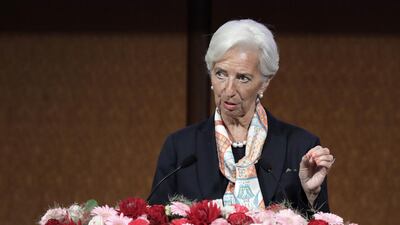The International Monetary Fund urged deeper cooperation among world economies in order to reduce tariffs and remove other obstacles to global trade, its managing director said.
“In my discussions with G20 Leaders, I noted that the global economy has hit a rough patch: investment has weakened and trade has slowed significantly, with export and import growth rates at their lowest level since the great financial crisis,” the IMF managing director Christine Lagarde said at the end of the summit of Group of 20 nations in Osaka, Japan on Saturday.
“Even though the IMF expects growth to strengthen somewhat going forward, the risks to the outlook remain serious,” she noted.
The biggest among these risks, Ms Lagarde said, is the uncertainty clouding global trade on the back of retaliatory tariffs imposed by the world's two biggest economies - the US and China. Last week, the two countries agreed to restart trade negotiations that broke down last month - a move that has removed an immediate threat to global growth for the time being.
Leaders from the G20 countries, the European Union and several other countries and international organisations were invited to participate in the discussions at the Osaka summit, which aimed to explore key issues related to the international financial system.
The talks this year were taking place againts the backdrop of a slowdown in the world economy. The IMF in April downgraded its global growth forecasts for this year, mainly due to persistent trade tensions between the US and China, and a slowing Chinese economy. Global gross domestic product growth is projected to slow to 3.3 per cent in 2019, down from the 3.5 per cent the IMF had forecast for 2019 in January.
The world economy is forecast to rise to 3.6 per cent in 2020, and plateau at 3.6 per cent in the medium term - sustained by the increase in the relative size of economies, such as those of China and India, that will outpace the growth of advanced and emerging market economies, the Washington-based lender said in its latest World Economic Outlook.
The cut in growth is the third time the IMF has downgraded its global outlook in the past six months. The 2019 outlook is also the weakest since the financial crisis, reflecting slowing growth in most advanced economies and signs that higher reciprocal export tariffs introduced by the US and China last year are weighing on trade.
“While the resumption of trade talks between the US and China is welcome, tariffs already implemented are holding back the global economy, and unresolved issues carry a great deal of uncertainty about the future,” Ms Lagarde said.
“I reiterated that the priority [this year] should be to reduce obstacles to trade - new and old, tariffs and otherwise - and to address the underlying sources of trade tensions and distortions.”
Global economies need a trading system “fit for today’s world”, which means addressing gaps in the international rule book, including areas such as agricultural and industrial subsidies, services and e-commerce, the IMF chief noted.
The IMF welcomed Japanese Prime Minister Shinzo Abe’s announcement of the Osaka Track framework relating to data flow and e-commerce and joined other leaders in calling for accelerated reform of the World Trade Organisation.
Improvements in fiscal policy to balance global debt levels that has spiralled in recent years - and reforms to support productivity and employment - are among the other areas the IMF underlined. The G20 must also continue efforts to address corporate taxation issues and regulations around financial corruption, climate change and women’s empowerment, it added.
“While the global economy is at a precarious stage, with the right policies and working together we can overcome the challenges we face and set the world on a path of stronger, more sustainable, balanced and inclusive growth,” Ms Lagarde said.

